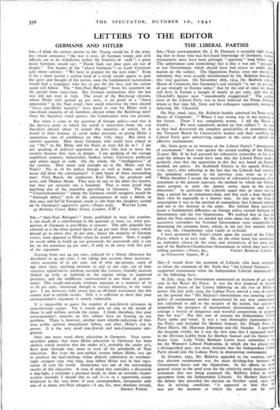LETTERS TO THE EDITOR
GERMANS AND HITLER
SIR,—I think the correct answer to Mr. Young would be, if the wire- less would announce "the war is over, all German troops and civil officials are to be withdrawn within the frontiers of 1938 "; a great many Germans would say: "Thank God, our dear ones are out of danger." The leaders of the "plural Germans "—as Lord Vansittart calls them—answer: "We have to prepare for the next time." Even if for a short period a certain kind of a revolt would appear to gain the spirit and thought of the nation, soon the fundamental nationalism_ would find a scapegoat, who has to pay for the loss, and the nation again will follow. The "Anti-Nazi Refugee" bases his argument on the period from 1932-1939. But German nationalism after the last war did not start in 1932. The result of the Reichstag election, where Hitler only gained 44 per cent., is no proof of a "fierce opposition" to the Nazi creed ; how could otherwise the then elected "fierce anti-Hitler majority" have dared to vote for Hitler with a two-thirds majority of all members elected when the Reichstag met? Only the Socialists voted against, the Communists were not present.
But when it came to the question of foreign policy—and that is the decisive point in which the world is interested—from the 119 Socialists elected about 70 joined this majority, of which, be it stated to their honour, 12 acted under pressure, so giving Hitler a
- unanimous vote of confidence on May 17th, 1933. But there is another question. How many Germans who could have risked to say " No " to Mr. Hitler and his Nazis in 1933 did do so ? I am not speaking of political opponents or Jews who had to leave the country because they were in danger. I am speaking of the average unpolitical scientist, industrialist, banker, writer, University professor and others equal in rank. On the whole, the " intelligentsia " of the country. How many said outright no to Mr. Hitler and his Nazis? No, to all his policy, foreign as well as home, and how many did draw the consequence? I only know of three outstanding man: Fritz Busch, the conductor, Karl Ebert, the producer an actor, and Thomas Mann. They may be one or the other less known, but they are certainly not a hundred. That is more proof than anything else of the mentality prevailing in Germany. The only " Unterrichtsminister" whom the Germans would recognise would be "thorough defeat," with all the consequences of such a defeat, so that once and for'all European youth is safe from the slaughter carried
on by Germany's aggressive spirit.—Yours truly, WALTER Loan. 39 Berkeley Court, Baker Street, London, N.W.


























 Previous page
Previous page